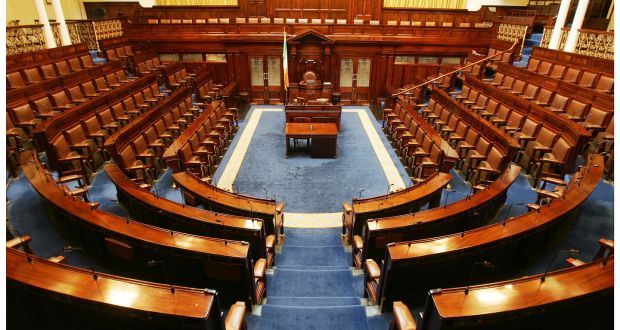The announced departure from the political stage of Frances Fitzgerald has happened well in advance of the European and local elections due next June. Her party has plenty of time now to select a candidate for the Dublin constituency. But who would they choose to run for what used, in any event, to be a safe constituency for one Fine Gael candidate?
Would any sitting TD seek the nomination? There are possibilities. Neale Richmond, the FG minister of state for European Affairs is a one realistic contender. His constituency running mate, Josepha Madigan, seems less likely. Of course, Richard Bruton could defer his departure from national politics to seek a five-year term in Brussels and Strasbourg. But that seems improbable.
If the selection convention is held anytime soon, Paschal Donohoe would seem to be excluded. His indication of a bid for the European Parliament would seriously weaken FG’s political profile for the next general election. It might also compromise any ambition he holds for high office in the Eurozone.
Jennifer Carroll MacNeill would be a strong, capable candidate. But does her ambition lie in Brussels at this point?
Could Neale Richmond and Fianna Fail’s Barry Andrews both be elected in a four-seat euro-constituency? Nothing is certain. It would be a scramble.
The broader political question is as to whether there will be a Dáil general election before next June. Leo Varadkar delayed dissolving the last Dáil and Fine Gael’s position suffered at the subsequent polls.
As Taoiseach with a majority in the Dáil, he has a clear constitutional right to advise the President on a dissolution. He does not need, in constitutional terms, to secure the agreement of his coalition partners before heading for the Park; good manners might suggest that he would do so. But if he saw advantage for Fine Gael in an early election, nothing would stand in his way.
This raises the question as to whether Fine Gael are likely to do reasonably well in the local and European elections in June next. If, on the contrary, they face being hammered by a well-organised and well-financed Sinn Féin campaign at local and European elections, would an autumn 2024 general election in a bruised and battered state be any more attractive for Fine Gael – or for Varadkar personally? Would he survive a party heave in the aftermath of a trouncing in the local and European polls in June?
Would there be some up-swing in the early autumn of 2024 that would reward him holding on for one more vote-buying budget?
If the answer is no, then a general election in mid-April/early May of 2024 has its party and personal attractions. The tax reliefs and energy credits will have lessened pressures on many families next Spring. Employment may still be buoyant. International financial conditions will probably be reasonably favourable – especially in a US presidential election year. Disappearing corporate tax windfalls might help in the sense that fiscal responsibility may play a greater role in political discourse.
Another small advantage is that the Seanad would be elected on the basis of the last local elections’ results which yielded Sinn Féin only four seats in a chamber of 60 members. That could change dramatically if the general election happens with or later than the local and European elections.
Plausible excuses for an early dissolution (if any are needed) could include differences of housing policy or the need for a constitutional amendment on housing rights, differences on road infrastructure, differences on asylum seeking and migration, differences on planning law reform and other issues where the Green party is creating rural dissatisfaction with the Government.
In the last analysis, the political calculus will depend on whether Fine Gael electoral prospects are likely to improve after June. As time runs out for this Dáil, political options narrow. Waiting, Micawber-like, for something to “turn up” is a very dangerous strategy. Unforeseen crises could coincide with a rapidly narrowing electoral window.
There is also a distinct possibility that the Green party might seek a quick trip to the lifeboats on an issue of importance to them. That way, they could heighten their profile and relevance in voters’ minds. While Varadkar could possibly survive their departure briefly on the votes of some independents, the simple fact is that independent TDs will not be happy to be a political mudguard in the run up to a dissolution called by an increasingly isolated and unpopular government.
While Varadkar undoubtedly likes being Taoiseach, he also likes being in control of his own political destiny. He knows that he dithered to his own detriment when he last was in the position to determine the timing of an election. He is generally known to be very conscious of his discretionary entitlement to have a Dáil dissolution.
All of these considerations loom large in the private imaginations of many currently in Leinster House.

